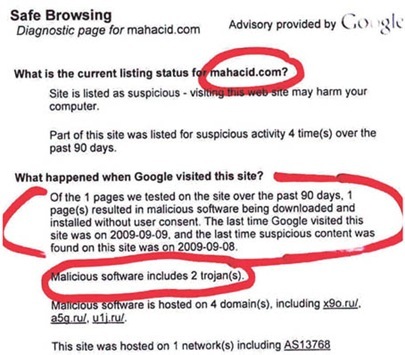When we wanted some information from the Maharashtra CID’s website —www.mahacid.com — yesterday, the message on its homepage said, ‘This site may harm your computer.’
 After repeated attempts to open the website through Google’s safe browsing diagnostic page, another message popped saying, ‘This site is listed as suspicious and visiting this website may harm your computer. Part of this site was listed for suspicious activity four times over the past 90 days.’
After repeated attempts to open the website through Google’s safe browsing diagnostic page, another message popped saying, ‘This site is listed as suspicious and visiting this website may harm your computer. Part of this site was listed for suspicious activity four times over the past 90 days.’
That’s when we realised that the website of the Maharashtra CID has been hacked.
Spreading malware
Rohit Srivastav, chief of ClubHack and a well-known security expert, checked out the website and confirmed that it had been attacked. "It has been hacked with the help of MPack tool. The purpose of the attacker is to spread malware," he said. Malware is short for malicious software and it is designed to infiltrate a computer or website without the owner’s informed consent.
Srivastav, who is also the director of Technology and Network Operations of next year’s Commonwealth Games in Delhi, added, "It is difficult to pinpoint who could have done it."
CID unaware
Superintendent of Police, CID, Dilip Bhujbal was visibly shocked when he was told that the website had been hacked. "I am not aware if our website has been attacked. But I will ask our cyber experts to check it," he said.
Inspector Pradip Desai who is in charge of the website, checked it and admitted that it had indeed been hacked. "We have to investigate the matter," he said. He assured us the website would be functioning normally from today.
Andhra CID too
Last November, the website of the Andhra Pradesh CID had been attacked by a group of hackers claiming to be from Pakistan.
MPack is a PHP-based malware kit produced by Russian crackers.
The first version was released in December 2006.
Since then, a new version is thought to have been released roughly every month.
It is thought to have been used to infect up to 1.6 lakh PCs with keylogging software.
Source: fulldhamaal.com